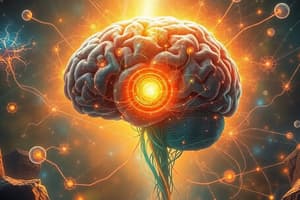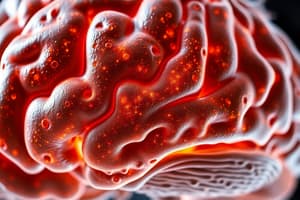Podcast
Questions and Answers
What is the term for the process by which information is gradually transferred from the hippocampus to other parts of the brain for long-term storage?
What is the term for the process by which information is gradually transferred from the hippocampus to other parts of the brain for long-term storage?
- Emotional expression
- Memory consolidation (correct)
- Long-term potentiation
- Neuroplasticity
Which of the following brain structures is NOT typically associated with language processing?
Which of the following brain structures is NOT typically associated with language processing?
- Striatum (correct)
- Hippocampus
- Wernicke's area
- Broca's area
What is the term for the loss of language ability due to brain damage?
What is the term for the loss of language ability due to brain damage?
- Dysarthria
- Apraxia of Speech
- Aphasia (correct)
- Alexia
Which of the following is a type of non-declarative memory?
Which of the following is a type of non-declarative memory?
What is the term for the strengthening of synaptic connections between neurons, which is thought to be involved in learning and memory?
What is the term for the strengthening of synaptic connections between neurons, which is thought to be involved in learning and memory?
Damage to which brain structure can lead to anterograde amnesia?
Damage to which brain structure can lead to anterograde amnesia?
What is the main goal when answering multiple-choice questions in an exam?
What is the main goal when answering multiple-choice questions in an exam?
What is the recommended approach to start with when answering multiple-choice questions?
What is the recommended approach to start with when answering multiple-choice questions?
What is the benefit of covering the answers and trying to answer the question purely on initial recollection?
What is the benefit of covering the answers and trying to answer the question purely on initial recollection?
What should you do if you are unsure of the answer to a multiple-choice question?
What should you do if you are unsure of the answer to a multiple-choice question?
What is an important aspect of exam preparation, aside from academic preparation?
What is an important aspect of exam preparation, aside from academic preparation?
Why is it important to check your QUT student emails regularly, especially if you have exam accommodations?
Why is it important to check your QUT student emails regularly, especially if you have exam accommodations?
What is the primary cause of limited information holding capacity in short-term memory?
What is the primary cause of limited information holding capacity in short-term memory?
Which phase of energy metabolism involves the breakdown of energy storage molecules?
Which phase of energy metabolism involves the breakdown of energy storage molecules?
What is the primary mechanism of drug action related to?
What is the primary mechanism of drug action related to?
What is the primary consequence of internal brain damage?
What is the primary consequence of internal brain damage?
Which of the following is a recommended strategy for effective studying?
Which of the following is a recommended strategy for effective studying?
What is the primary role of learning in drug tolerance?
What is the primary role of learning in drug tolerance?
What is the primary factor influencing how and when we eat?
What is the primary factor influencing how and when we eat?
What is the primary goal of neuroplastic responses to brain damage?
What is the primary goal of neuroplastic responses to brain damage?
Flashcards are hidden until you start studying
Study Notes
Non-Declarative Memories
- Relevant brain anatomy involves the medial temporal lobe (MTL) and non-MTL structures in learning and memory
- MTL amnesia affects memory consolidation
- Non-MTL structures, such as the striatum, play roles in learning and memory
- Long-term potentiation (LTP) is a cellular basis of learning and memory
Emotion and Stress
- Emotions can be approached as discrete (basic) emotions or emerging constructs
- Fear and anxiety have neurobiological bases
- Brain structures involved in emotion and stress include those related to fear and aggression
- Stress affects immunology
Language
- Language disorders include aphasia, dysarthria, apraxia of speech, alexia, and agraphia
- Classic views of aphasia and psycholinguistics are important in understanding language disorders
- The brain represents word meaning in complex ways
Hunger and Eating Behaviour
- Eating involves digestion, storage, and release of energy in three phases of energy metabolism
- Theories of eating and hunger include various factors that influence food intake
- Neurobiological findings relate to feeding and satiety
Drug Use & Addiction
- Basic principles of drug action involve routes of administration, mechanisms of action, dependence, tolerance, and withdrawal
- Learning plays a role in drug tolerance and relapse
- Theories of addiction have neurobiological evidence
Brain Damage & Neuroplasticity
- Causes of brain damage include internal and external factors, leading to different types of cell death and consequences
- Neurological/neurocognitive disorders result from brain damage
- Neuroplastic responses to brain damage enable recovery of brain function after CNS damage
Exam Preparation
- General exam tips include starting to study early, reducing anxiety, and engaging in deep level processing of material
- Strategies for responding to multiple-choice questions include covering answers, reading questions carefully, and eliminating options
Exam Prep Basics
- Important exam prep basics include checking the time and location of the exam, getting a good night's sleep, and checking QUT student emails regularly
Studying That Suits You
Use AI to generate personalized quizzes and flashcards to suit your learning preferences.




